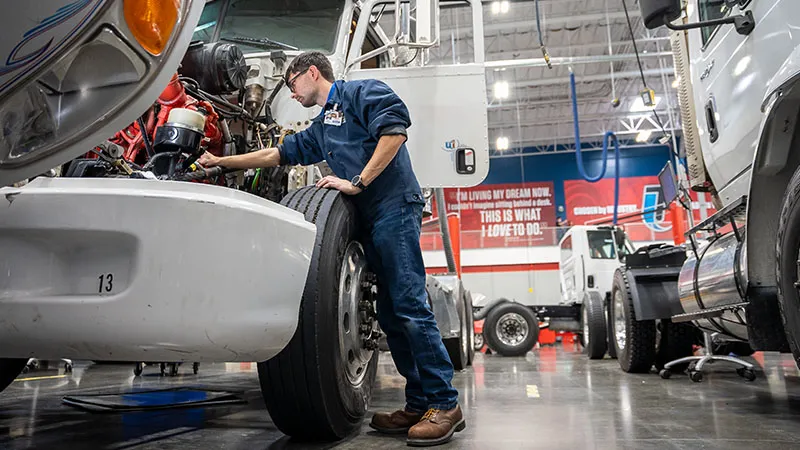Why Diesel Technology Is a Growing Career Choice
Diesel Tech Schools When you think about career options that never seem to slow down, diesel technology has to be on the list. Trucks, buses, construction machinery, and agricultural equipment all rely on diesel engines, and these industries are the backbone of our economy. Without skilled diesel technicians, transportation and logistics would grind to a halt. That’s why diesel tech schools are attracting more students than ever before.
Another reason diesel technology is booming is the stability of the field. Unlike some industries that fluctuate with economic trends, diesel-powered equipment remains essential. Goods must still be transported, farms must keep running, and cities need buses to move people around. This consistency makes a career in diesel technology a reliable choice, especially for people looking for long-term stability.
On top of that, the demand for diesel technicians continues to rise. Companies across the country are struggling to fill positions with qualified professionals, which means job security and competitive pay are part of the package. For those considering a career change or entering the workforce for the first time, diesel technology offers a path that is both practical and rewarding.
What Exactly Do Diesel Tech Schools Teach?

Diesel tech schools are designed to prepare students with the skills they need to diagnose, repair, and maintain diesel engines and systems. This isn’t just about turning a wrench—it’s a combination of hands-on training and classroom instruction. Students learn how to work on everything from trucks and buses to heavy-duty construction equipment and even marine engines.
The curriculum often includes courses in engine repair, hydraulics, fuel systems, electrical systems, and diagnostics. As technology advances, modern diesel engines are more computerized than ever. That means students also need to learn how to use advanced diagnostic tools and software to troubleshoot problems. Schools focus on ensuring graduates are ready to step into the field and adapt to the latest innovations.
Another big part of Diesel Tech Schools training is safety and efficiency. Working with heavy equipment requires strict safety standards, and employers expect technicians to be mindful of procedures that protect both workers and machines. Schools teach not only the technical aspects but also the importance of professionalism, teamwork, and communication—skills that make technicians more valuable in the workplace.
Hands-On Training: The Heart of Diesel Tech Schools Education
One of the biggest reasons students choose diesel tech schools over traditional four-year programs is the emphasis on hands-on training. Instead of sitting in lecture halls all day, students spend a significant portion of their education working directly on engines, equipment, and diagnostic systems. This approach gives them real-world experience before they even graduate.
Many schools have labs that simulate professional shop environments. Students practice disassembling engines, identifying faulty parts, and reassembling them to manufacturer standards. This kind of learning sticks with you far more than just reading from a textbook. Employers love graduates who can hit the ground running without needing months of additional training.
Hands-on training also builds confidence. By the time students graduate, they’ve already faced common repair challenges and know how to solve them. This not only makes them employable but also positions them as professionals ready to take on more responsibility early in their careers.
Career Opportunities After Diesel Tech School
Graduating from a Diesel Tech Schools program opens the door to a variety of career paths. The most common route is working as a diesel mechanic or technician in a repair shop, trucking company, or dealership. These roles involve repairing and maintaining vehicles like semi-trucks, buses, and heavy equipment. But that’s just the beginning.
Some graduates move into specialized fields, such as working on agricultural machinery, construction equipment, or marine diesel engines. Each of these areas offers its own unique challenges and opportunities. For example, a technician working on farm equipment may spend more time in rural areas, while those in transportation hubs may focus on fleet maintenance for trucks.
As experience grows, many technicians transition into supervisory roles, shop foreman positions, or even open their own repair businesses. Others choose to continue their education and become instructors at diesel tech schools, passing on their knowledge to the next generation of technicians. The career flexibility makes diesel technology a great long-term choice.
Salary and Job Outlook for Diesel Technicians
One of the most attractive aspects of becoming a diesel technician is the earning potential. While salaries vary depending on location, specialization, and experience, most Diesel Tech Schools earn competitive wages right out of school. According to industry reports, the median pay for diesel mechanics is higher than many other trade careers.
Entry-level technicians often start with solid wages, and as they gain experience and certifications, their earning potential grows significantly. Specialized technicians, such as those working on heavy-duty construction equipment or marine engines, can command even higher salaries. The opportunity for overtime pay also adds to the appeal, as many industries operate around the clock and require technicians on demand.
The job outlook is equally promising. With a shortage of skilled workers in the field, employers are offering incentives such as signing bonuses, tool allowances, and training reimbursements to attract new talent. For anyone entering the workforce, this demand translates into greater job security and plenty of career opportunities.
Choosing the Right Diesel Tech School for You
Not all diesel tech schools are created equal, so choosing the right one is an important step. Location, tuition costs, program length, and reputation all matter when making your decision. Some schools offer certificate programs that take about a year to complete, while others have associate degree options that last two years and provide a more in-depth education.
Accreditation is another key factor. Accredited schools are recognized for meeting industry standards, which not only ensures quality education but also makes it easier to qualify for financial aid. Students should also look at graduation rates and job placement assistance, since these reflect how well the school prepares students for the real world.
Finally, it’s a good idea to visit campuses, tour labs, and talk to instructors and current students before enrolling. Getting a feel for the learning environment will help you determine if the program fits your learning style and career goals. Remember, the right school should not only teach you skills but also support your success in landing a job after graduation.
Final Thoughts: Is Diesel Tech School Worth It?
The short answer is yes. Diesel tech schools provide a direct pathway into a high-demand, stable, and rewarding career. Unlike traditional college degrees that can take four years or more, most Diesel Tech Schools programs are completed in one to two years, allowing students to start working and earning sooner.
The blend of hands-on training, strong job demand, and competitive salaries make this career path appealing for people who enjoy working with their hands and solving mechanical problems Diesel Tech Schools. Plus, the flexibility in career opportunities—from working in shops to specialized industries—means graduates can find a niche that suits their lifestyle.
At the end of the day, diesel tech schools are about more than just fixing engines. They’re about building a future in a field that keeps the world moving. If you’re looking for a career that’s practical, respected, and in demand, enrolling in a diesel tech school might just be the smartest move you make.





